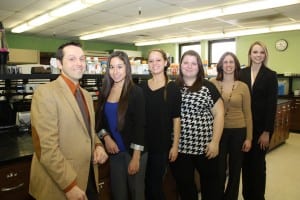WEST LIBERTY, W.Va., Feb. 9, 2015 — West Liberty University biology students, researching in the lab of Dr. Joseph Horzempa, left a positive impression on attendees of the Mid-Atlantic Microbial Pathogenesis Meeting (MAMPM), held in Virginia recently.

“The students and Dr. Horzempa’s post-doctoral research associate, Dr. Deanna Schmitt, represented WLU wonderfully at this scientific conference,” said Dr. Robert Kreisberg, Dean of the College of Science. “Our students were the only undergraduates presenting research or even attending the meeting. Since it was our first time in attendance, we are very proud of Dr. Horzempa and his lab team.”
Horzempa, Schmitt and students Matthew Ford, Ashley Haught, Leanne Mazzella and Taylor Rogerson presented their research findings to the meeting participants, which included graduate level students, professional scientists and researchers from many schools, hospitals and laboratories.
“It was fantastic to present my research to this group and to talk to others working in my field of research,” said Mazzella, who is from Wellsburg, W.Va. and will graduate in May. Mazzella has been accepted into WLU’s physician assistant program for July 2015.
The WLU scientists’ research focused on determining how a bacterium known as “Francisella tularensis” invades red blood cells. They presented the results of experiments indicating that “Francisella” hijacks red blood cells to increase its capability to colonize ticks – a natural disease carrier of this pathogen.
The students and faculty presented their work to leaders in the field of microbial pathogenesis research, including representatives from laboratories from Harvard, University of North Carolina Chapel Hill, University of Virginia, Uniformed Services University of the Health Sciences, University of Maryland, St. Jude Children’s Research Hospital and Duke University Medical Center, among others.
“I learned that the pathogen we work with has many researchers interested and I learned so much from the many talks, programs and papers that we attended or shared,” said Rebecca Barnes, of Wheeling, who plans on entering medical school in the future. A junior at WLU, she described the event as a graduate level opportunity where she was able to learn and network with other scientists.
Sophomores Taylor Rogerson and Ashley Haught, both of Moundsville, were especially excited with the chance to attend the conference.
“It was awesome to go to the conference. We were younger than most of the attendees and it was a real chance to learn and prepare for our future,” said Rogerson.
The meeting took place Jan. 25-27 and was designed to foster communication and collaboration between scientists engaged in microbial pathogenesis research.
Providing such opportunities for young scientists is important for their scientific development and has been one of the most appealing aspects of this conference.
“All of the WLU presenters were awarded travel grants from the organizers of this meeting based on the merit of their research findings,” added Kreisberg.
“I’m pleased with our lab’s performance in this scholarly meeting and hope we can do it again soon. Professional conferences are an important part of a university education and West Liberty University’s students welcome the chance to learn from national leaders,” Horzempa said.
Horzempa has been working on this pathogen since 2006, when he was a postdoctoral research associate at the University of Pittsburgh. The research laboratory he has established at WLU is a busy place that students enjoy.
“It’s great when our biology students get firsthand experience with research that can eventually aid in the development of therapies and vaccines,” he said. “We look forward to continuing our research and building an even stronger program.”
The biology department is housed in the College of Sciences. For more information, please visit westliberty.edu or call 1.866.WESTLIB.